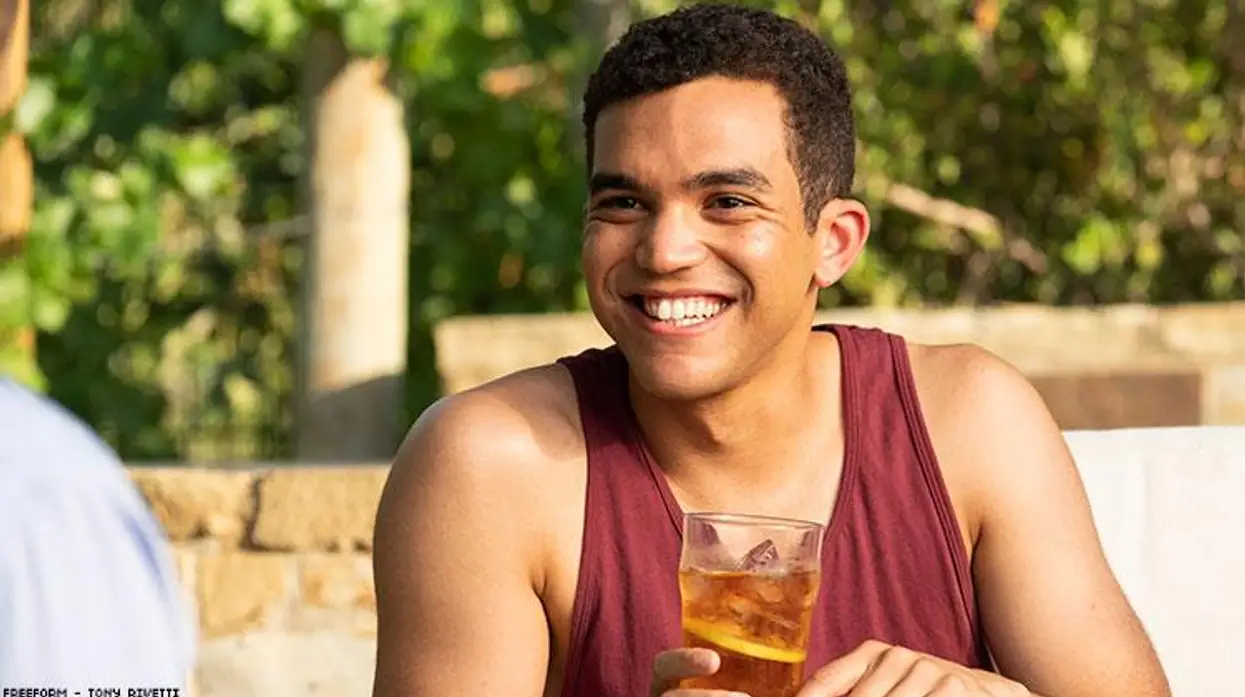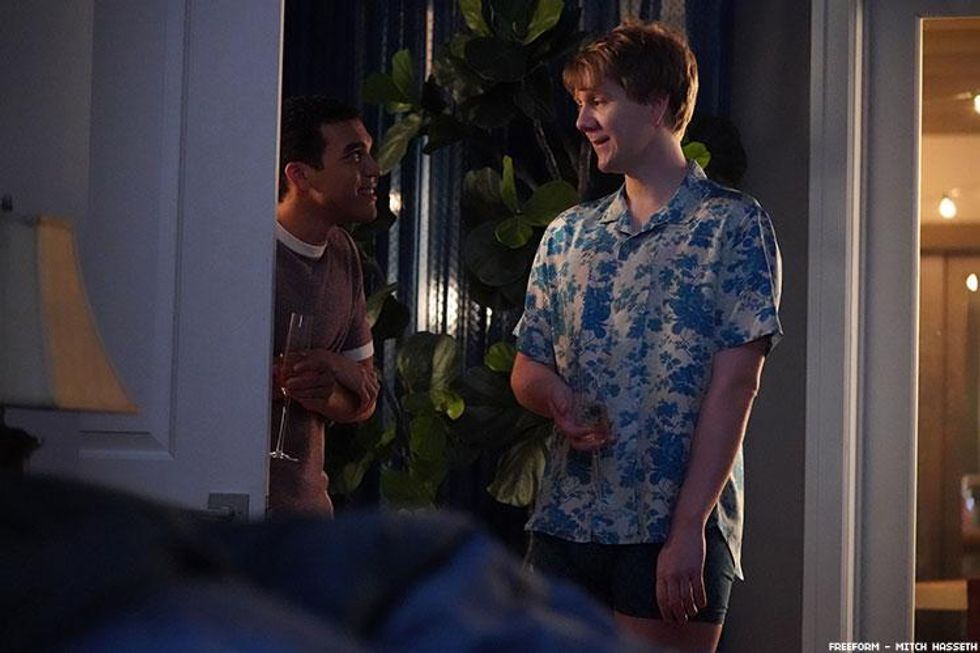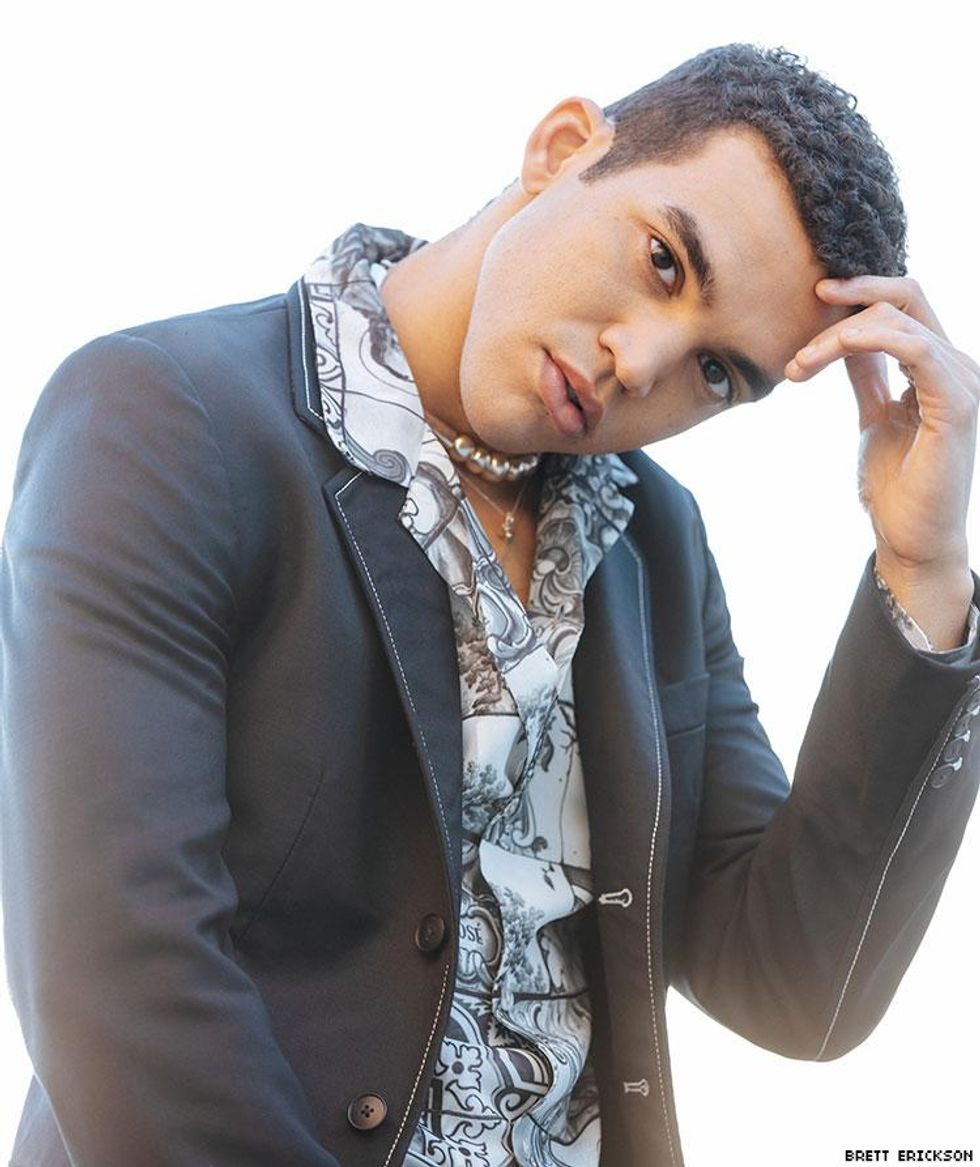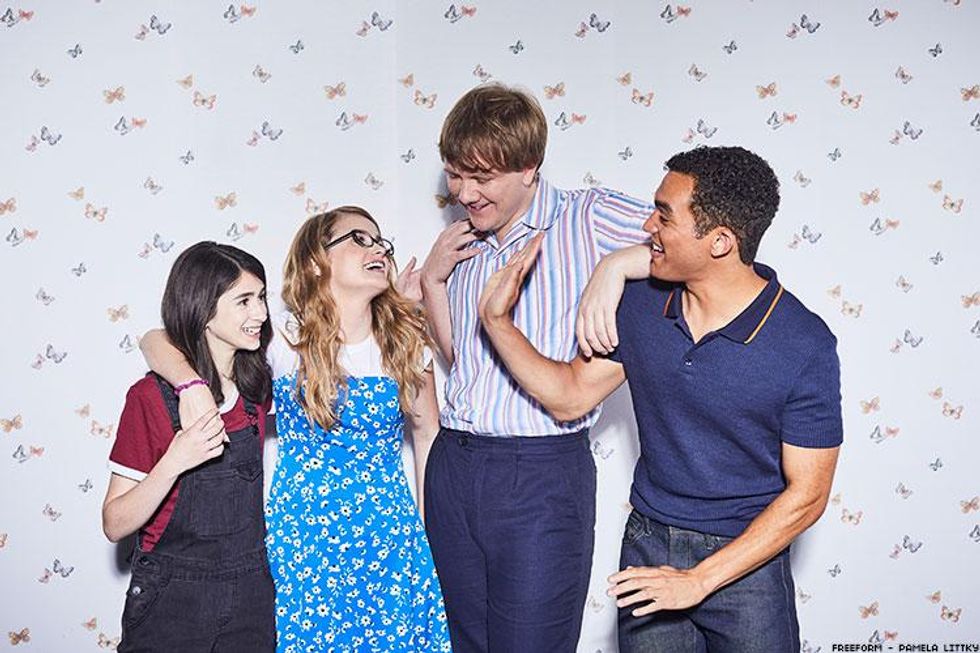On Everything's Gonna Be Okay -- a new Freeform series from Josh Thomas (Please Like Me) -- Adam Faison portrays a dental student, Alex, who is dating Nicholas (Thomas), an Australian 20-something tasked with raising his teenage half-sisters, one of them autistic, after their father dies suddenly of pancreatic cancer.
The story then becomes almost a fairy tale -- orphans raising one another in a beautiful house located on the rural outskirts of Los Angeles surrounded by flowers and a variety of exotic insects; Nicholas is an entomologist -- and at one point, Alex wonders if he might secretly be a prince due to the grandeur of his father's home. The show is a comedy, but it also deals frankly with topics that are taboo on TV like gay sex, death, and developmental disorders. It also marks the first time Faison, a gay actor of color, has seen himself represented on television.
"I'm so excited about this role because this character, it reminds me so much of me," he told The Advocate in a recent interview. "I've never seen anybody on TV that looks like me."
Faison is not the only one for whom the diverse ecosystem of Everything's Gonna Be Okay resonated. The actor recalled the surprise of receiving a message on social media from a girl with an autistic sibling whose parents had recently died -- one of them of cancer. However, most other points of relation are not as eerily specific. For example, at this year's Autfest Film Festival, an event promoting acceptance of the autistic community and its representations, an attendee told the cast how much he related to Matilda, an autistic teen who plays the piano as a creative outlet. The character is played by Kayla Cromer, the first autistic woman to be authentically cast as a series regular on TV.
"It just spoke volumes about how impactful this show has the potential to be and has been," Faison marveled.
That said, these characters are not angelic avatars of diversity. It was important for Thomas, said Faison, to portray them as "humans living life and that happened to have these identities." Each has flaws. Nicholas orders a limousine with party lights to transport his family members to their father's funeral. The 14-year-old Genevieve (Maeve Press) drops a corner of her father's coffin as a pallbearer. In another episode, Nicholas and Alex sanction and facilitate Matilda's underage drinking to the point of vomiting.
This worldview resonates with Faison. He too resists being defined by his identity within his personal and professional life.
"It's a part of me, but it doesn't define me," Faison said of his sexual orientation. "I hope that producers and executives that see it [realize that] too."
"As an actor, our job is to transform ourselves and find similarities in people that are different than us. And I hope that they see that even though I am queer, it doesn't define every aspect of me and I can also play other roles."
 Adam Faison and Josh Thomas on Everything's Gonna Be Okay
Adam Faison and Josh Thomas on Everything's Gonna Be Okay
Faison has reason to believe that some in Hollywood harbor "archaic" attitudes about the ability of LGBTQ actors to portray any part. He recalled an audition years ago in which a casting director, who he did not name, deemed him too "light in the loafers" for a role. The director himself was a gay man.
While Faison ended up getting the part, the experience left him with the realization that there was still a lot of work to be done. "It actually wasn't shocking to me because I've [known] guys before in the gay community lambaste other queer people for being a 'too femme' or like 'too much of a fag,'" said Faison. He sees internalized homophobia as a very real issue plaguing queer people, which in turn influences the entertainment industry many of them work in.
As for his own career, Faison has never been closeted as an actor. But that remark, even today, dredges up painful memories of "people in your path telling you that who you are is too much or it's ugly or it can't be palatable for society." He recalled being bullied growing up in Poway, a town near San Diego, which despite azure perceptions of California is a "very red city" due to the heavy military presence in the region. Poway's father was a Marine.
However, even when faced with antigay antagonism, Faison finds comfort in the words of Will & Grace's Jack (Sean Hayes): "I'd rather be a fag than be afraid."
While Faison, as an actor, has the ability to portray any role, he also acknowledges the power of authentic casting when it comes to the portrayal of marginalized people. The fact that he and Thomas are both out gay men playing gay roles on television is still remarkable in an industry where plum LGBTQ parts still often go to more famous straight counterparts.
Faison has always felt something inherently off about that trend. However talented a straight actor may be, he or she does not "know the experience of what it's like living every day in the life of a person who's being bullied or called a flamer or f****t in school for wearing frickin' different clothes," said Faison. He pointed to his own teenage fondness for Abercrombie & Fitch paired with clogs as a queer sartorial choice that made him a target of bullies.
Even with Will & Grace, a young Faison always felt "a little bit let down" that none of the gay characters was portrayed by an out actor -- Hayes did not come out until after the original run ended. Thus, rare victories of LGBTQ representation in the '90s and early '00s were always mixed with a measure of disappointment, especially for "a young queer kid" who found refuge acting in his local Jewish community center. Where was the future, then, in acting's mecca?
"I felt like, Oh, dang, they're playing [LGBTQ] people. But in real life, they get to go back to their existence of who they are and their privilege of being straight," he said.
Everything's Gonna Be Okay -- and the explosion of other television shows featuring authentic LGBTQ representation -- has helped change that game for a new generation of actors and the viewers they inspire. "I'm just excited for other kids. I think growing up now to see somebody authentically who has gone through this experience playing that on-screen? It feels really special," he said.
As an actor, Faison also felt empowered performing in sex scenes with another queer male actor, as well as having a transgender director, Silas Howard, in Everything's Gonna Be Okay. Notably, Alex is his first gay role of substance, and it helped Faison to have an LGBTQ presence on set when it came to filming the intricacies of queer love. "It was just sort of this unspoken thing where we didn't have to muscle through any of the directions or like how the relationship would go or have to deal with these like weird stereotypes," he said.

"It was exciting and liberating to feel sexy in my queerness," Faison said of the experience. "For so long, society tells you who you are is unattractive because you have these qualities to you. And it was just really, really transformative for me to feel like I was sexy." For the record, both characters are versatile, which Faison believes defies the stereotypes of the bedroom positions preferred by "masculine" or "feminine" men in a given relationship.
Faison also knows that, even with the progress that has been made in LGBTQ acceptance since his youth, the fight against bullying is ongoing, especially in digital spaces. For example, after Everything's Gonna Be Okay premiered on Freeform earlier this month, he received a message from an antigay viewer on Instagram that told him "you're going to go to hell and your mom must be ashamed that you take dick."
"People still are very closed-minded in their beliefs. I think like we still have a long way to go," said Faison, who believes more productions like Everything's Gonna Be Okay are essential to that change.
In addition to gay representation, Faison is excited about the show's capacity to move hearts and minds about the autistic community. Matilda herself is a very human character, and the show's exploration of her sexuality is groundbreaking in and of itself for television. Moreover, Faison has ties to the community. His mother worked with autistic children while he was growing up, and as a result, many of his friends are autistic. Thus, many of the lessons she taught him are now being broadcast through the work he is doing.
"My mom was always big about leading with kindness and treating others the way that you want to be treated," Faison said. "It's something that's had a huge impact on my life and feels really serendipitous that I'm a part of this show that is teaching that in a roundabout way and dealing with people who are just trying their best and leading with positive outlooks."
 Maeve Press, Kayla Cromer, Josh Thomas, Adam Faison
Maeve Press, Kayla Cromer, Josh Thomas, Adam Faison
Faison's mother was also on his mind as he filmed the portions of Everything's Gonna Be Okay that dealt with the death of a parent. Throughout production, his mom had health issues that required visits to an oncology center. The possibility of her passing weighed heavily on his mind.
But in these visits, he also found encouragement in the patients he met there. "They would just have these stories and they'd just be living life -- not talking constantly about their disease or how close they could possibly be to death but just having moments of laughter," he recalled. "Even when they were so fatigued, they were always trying to find the light."
They -- and the philosophy governing Everything's Gonna Be Okay -- helped Faison find his own light through the ordeal. "This past couple of years has inextricably changed who I am as a person," he said.
In this way, he has found a new mantra in the show's title. "There are issues in everyday life but they are surmountable. People can get through them with somewhat of a positive outlook," said Faison, who now sees the glass as half full.
However, Faison also admitted that in a show (and a world) with unexpected and tragic events, there may be a subversive layer to the title's meaning, which upends the phrase's traditional use as a platitude during dark times.
"If we tell ourselves it will [work out], sometimes it will," he concluded. "But it might not work out. And that's all right too."
Everything's Gonna Be Okay airs Thursdays on Freeform at 8:30 p.m. Eastern and 7:30 p.m. Central. Watch the trailer below.


 Adam Faison and Josh Thomas on Everything's Gonna Be Okay
Adam Faison and Josh Thomas on Everything's Gonna Be Okay
 Maeve Press, Kayla Cromer, Josh Thomas, Adam Faison
Maeve Press, Kayla Cromer, Josh Thomas, Adam Faison

































































Charlie Kirk DID say stoning gay people was the 'perfect law' — and these other heinous quotes